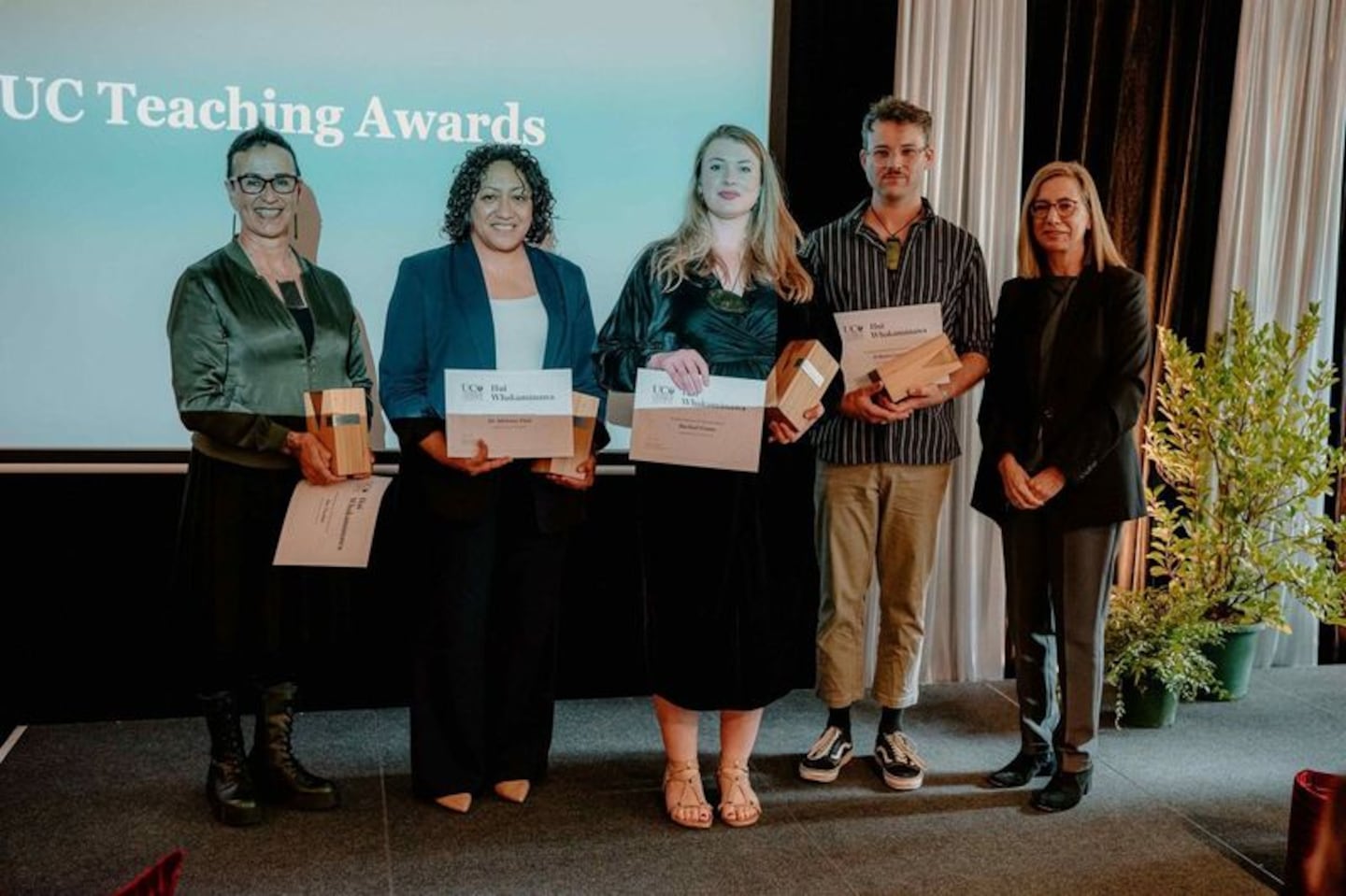An initiative embedding tikanga Māori within the Bachelor of Laws degree at the University of Canterbury has won the university’s Hapori Community of Practice Award.
The award recognises staff who support learners from a wider perspective and was presented to the leaders of Indigenising the LLB, an initiative supporting staff to embed tikanga Māori within the degree.
The initiative is led by Māori lecturers William Grant, Rachael Evans, Dr Adrienne Paul and the Faculty of Law kaiārahi Dee Tawhai.
Grant says the initiative is about integrating different perspectives, examining intersections, and fostering respectful discussions in a safe environment so that students can leave university able to critically question the status quo.
“They should be critical of those historical structures our law degree has been complicit in maintaining, the law and the state legal system and how these engage with tikanga Māori and concepts and influences of colonisation.”
Grant, of Ngāi Tahu and Ngāti Porou, says the initiative is important since there has been greater recognition by the courts of the place of tikanga Māori in influencing the development of the common law of Aotearoa.
“As such, legal institutions are increasingly acknowledging tikanga Māori as a legitimate source of law. The law degree must be responsive and relevant to this changing tide in the profession. This prompted the Council of Legal Education, and law schools, to implement one of the most substantial systemic changes to the Bachelor of Laws (LLB) since 1925.”
Failed requests to stop compulsory tikanga Māori studies
It comes after failed requests were made by King’s Counsel Gary Judd earlier this year to stop compulsory tikanga Māori studies for law students.
Judd told MPs that law students were being “co-opted” into advancing a political agenda of decolonisation by having to do the course.
But Grant says, “some of Gary Judd’s concerns that we are forcing our students to be captive audiences to a non-secular programme might be slightly misguided. What we are doing is we are teaching the law but we are teaching different perspectives on the law.”
Gary says students at the university actually expect to be taught tikanga Māori as part of their degree.
“There was a survey done by the New Zealand Law Students Society, which showed an overwhelming support by our existing law students that they really do expect that as it applies to the law, and colonisation is to be included in their law degrees.”
Grant says Judd would benefit from the 300-level course, an advanced undergraduate course, that the university is developing.
“We’re developing a 300-level course that will be open and available to the profession as part of their professional development because there are many generations of lawyers still in practice who haven’t had the benefit of the curriculum changes that we are making now.”
Improvement in Māori student pass rate
Grant says their students are already starting to see the benefits of learning about tikanga Māori. Compared to last year, there has also been an increase in Māori student pass rates.
“There are probably a number of factors that are influencing the increase in pass rates but I think I would be remiss in saying that there wasn’t some sort of influence based on this project. So, having more visibility, having more awareness, is a direct benefit for our students, and because our staff are now more aware of colonisation, they’re more aware of how our Māori students learn, and I think that our staff are now more open to shifting their approaches to teaching.”
Wānanga and weekly hourly sessions
As part of Indigenising the LLB, an overnight noho and wānanga was held at Rāpaki marae to help university law staff learn about te ao Māori from something other than a textbook.
“It was super beneficial for our staff members, and, in fact it was the first time that many of our academic staff members have ever gone on to a marae and whilst quite a few of them were a little bit nervous about the noho, they were super enthusiastic and they loved it to the point where they have specifically asked that we continue this into the future.”
Once a fortnight a session is held by the Faculty of Law kaiārahi Dee Tawhai to support staff.
“She leads these bicultural conversations essentially with our staff members, so they can explore te reo Māori, they can explore tikanga Māori, they can explore their cases they’re looking at for their courses and how it might relate to these questions of tikanga,” says Grant.
Tawhai, of Ngāpuhi, says, “Te reo Māori is central - everything from te ao Māori comes from the language. It’s about grasping the profound meanings within words, their origins, and cultural significance.”
Grant says he sees the future of legal education at Te Whare Wānanga o Waitaha as being innovative, bicultural and critical, yet grounded in a South Island/Ngāi Tahu context.
“I see our law graduates making a real impact, both in terms of jurisprudence, to how the law develops, and the ongoing dialogue between tikanga Māori and the state legal system.”



